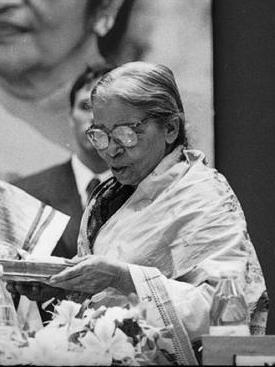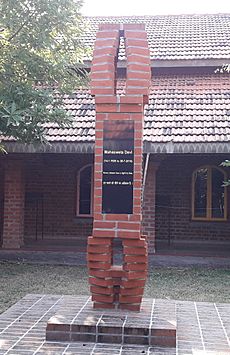Mahasweta Devi facts for kids
Quick facts for kids
Mahasweta Devi
|
|
|---|---|

Devi at the Ramon Magsaysay Award ceremony (1997)
|
|
| Born | 14 January 1926 Dhaka, Bengal Presidency, British India (now in Bangladesh) |
| Died | 28 July 2016 (aged 90) Kolkata, West Bengal, India |
| Occupation | Writer, activist |
| Alma mater | Visva-Bharati University Calcutta University |
| Notable works | Hajar Churashir Maa (Mother of 1084) Aranyer Adhikar (The Right of the Forest) Titu Mir |
| Notable awards | Padma Vibhushan Padma Shri Sahitya Akademi Award Ramon Magsaysay Award Jnanpith Award |
| Spouse | Bijon Bhattacharya (1947–1962) Asit Gupta (1965–1976) |
| Children | Nabarun Bhattacharya |
| Relatives | Manish Ghatak (father) Dharitri Devi (mother) Ritwik Ghatak (uncle) |
| Signature | |
Mahasweta Devi (born January 14, 1926 – died July 28, 2016) was an amazing writer from India. She wrote in the Bengali language and was also a strong activist. Some of her most famous books are Hajar Churashir Maa, Rudali, and Aranyer Adhikar.
Mahasweta Devi worked hard to help tribal people in states like West Bengal, Bihar, Madhya Pradesh, and Chhattisgarh. She fought for their rights and to make their lives better. She received many important awards for her writing and social work. These include the Sahitya Akademi Award, Jnanpith Award, and Ramon Magsaysay Award. She also got India's high civilian awards, Padma Shri and Padma Vibhushan.
Contents
Early Life and Education
Mahasweta Devi was born on January 14, 1926, in Dacca, which was then part of British India. Today, this city is Dhaka, the capital of Bangladesh. Her family was a Brahmin family.
Her father, Manish Ghatak, was a poet and writer. He used the pen name Jubanashwa. Manish Ghatak's brother was the famous filmmaker Ritwik Ghatak. Mahasweta Devi's mother, Dharitri Devi, was also a writer and worked to help people in society.
Mahasweta Devi started school in Dhaka in 1930. Later, she moved to West Bengal, which is now in India. She went to different schools there. She studied at Rabindranath Tagore's Visva-Bharati University. She earned a degree in English from there. Then, she got her master's degree in English from Calcutta University.
Her Career as a Writer
Mahasweta Devi wrote over 100 novels and more than 20 collections of short stories. Most of her works were in Bengali. Many of them were later translated into other languages. Her first novel, Jhansir Rani, was published in 1956. This book was about the life of the brave Rani of Jhansi. To write it, she traveled to the Jhansi area. She collected information and folk songs from the local people.
Writing for Change
Mahasweta Devi focused her writing on the lives of Adivasi (tribal), Dalit (people who faced discrimination), and other marginalized people. She especially wrote about the women in these groups. Her stories showed how these people fought against unfair rules and powerful people.
She lived in Adivasi villages for many years. She made friends with the people and learned about their lives. She put their struggles and sacrifices into her books and characters. She often said that her stories were not her own ideas. Instead, they were the true stories of the people of her country. One example is her work "Chotti Mundi Ebong Tar Tir."
In 1964, she started teaching at Vijaygarh Jyotish Ray College. This college was for working-class women students. While teaching, she also worked as a journalist and continued writing. She studied the Lodhas and Shabars, who are tribal groups in West Bengal. She also wrote about women and Dalits.
Her Bengali stories often showed the harsh treatment of tribal people and those considered "untouchable." They were often oppressed by powerful landlords, money-lenders, and corrupt government officials. She explained what inspired her writing:
I have always believed that the real history is made by ordinary people. I constantly come across the reappearance, in various forms, of folklore, ballads, myths and legends, carried by ordinary people across generations. ... The reason and inspiration for my writing are those people who are exploited and used, and yet do not accept defeat. For me, the endless source of ingredients for writing is in these amazingly noble, suffering human beings. Why should I look for my raw material elsewhere, once I have started knowing them? Sometimes it seems to me that my writing is really their doing.
Her Social Activism
Mahasweta Devi spoke out many times against the unfair treatment of tribal people in India. Her 1977 novel Aranyer Adhikar (Right to the Forest) was about the life of Birsa Munda. Birsa Munda was an important young tribal leader. In 2016, because of Devi's efforts, the government removed chains from a statue of Munda. The chains were there because the statue was based on an old photo from the time of British rule.
Devi also led a movement against a government policy in West Bengal. This policy allowed the government to take large areas of farmland from farmers. The land was then given to big companies for very low prices. She strongly criticized this. She supported Mamata Banerjee in the 2011 election. This election ended a long period of rule by another political party.
She also helped other writers. For example, she helped Manoranjan Byapari become well-known. His first writings were published in her journal.
At the Frankfurt Book Fair in 2006, she gave a powerful speech. She made the audience emotional with lines from a famous Indian film song:
This is truly the age where the Joota (shoe) is Japani (Japanese), Patloon (pants) is Englistani (British), the Topi (hat) is Roosi (Russian), But the Dil... Dil (heart) is always Hindustani (Indian)... My country, Torn, Tattered, Proud, Beautiful, Hot, Humid, Cold, Sandy, Shining India. My country.
Mahasweta Devi also worked to save people from the death penalty. In 1997, she led a campaign that helped two people avoid the death sentence. In 2012, she signed a petition with over 215 other people. This petition asked the president to choose life imprisonment instead of the death penalty for a person convicted after the 2008 Mumbai attacks. The letter said, "In the land of Buddha, Mahavira and Gandhiji, let it not be said there is no place in our hearts for mercy."
Personal Life
On February 27, 1947, Mahasweta Devi married Bijon Bhattacharya. He was a famous playwright and helped start the Indian People's Theatre Association. In 1948, their son, Nabarun Bhattacharya, was born. He later became a writer and critic.
Mahasweta Devi worked in a post office for a while. But she was fired because of her political beliefs. After that, she did many different jobs. She sold soaps and wrote letters in English for people who couldn't read or write it themselves. In 1962, she divorced Bhattacharya and married another author, Asit Gupta. Their marriage ended in 1976.
Her Passing Away
On July 23, 2016, Mahasweta Devi had a serious heart attack. She was taken to a hospital in Kolkata. She passed away on July 28, 2016, at the age of 90. She had been suffering from diabetes, sepsis, and a urinary infection.
After her death, many important people shared their sadness. The Chief Minister of West Bengal, Mamata Banerjee, tweeted that India had lost a great writer and Bengal had lost a glorious mother. Prime Minister Narendra Modi also tweeted, saying that Mahasweta Devi showed the power of writing. He called her a voice of kindness, fairness, and justice.
Awards and Recognition
Mahasweta Devi received many important awards for her work:
- 1979: Sahitya Akademi Award for her novel Aranyer Adhikar.
- 1986: Padma Shri for her social work.
- 1996: Jnanpith Award – India's highest literary award.
- 1997: Ramon Magsaysay Award for her "compassionate crusade through art and activism to claim for tribal peoples a just and honorable place in India's national life."
- 2003: Officier de l'Ordre des Arts et des Lettres (an award from France).
- 2006: Padma Vibhushan – India's second-highest civilian award.
- 2007: SAARC Literary Award.
- 2009: She was considered for the Man Booker International Prize.
- 2010: Yashwantrao Chavan National Award.
- 2011: Banga Bibhushan – the highest civilian award from the Government of West Bengal.
- 2012: Nominated for the Nobel Prize for Literature.
- 2018: Google honored Mahasweta Devi on her 92nd birthday by creating a special Google Doodle for her.
Major Works
Some of Mahasweta Devi's most important works include:
- Jhansi Rani (1956, a biography of Rani Lakshmi Bai)
- Hajar Churashir Maa (1974, novel, meaning Mother of 1084)
- Aranyer Adhikar (1979, novel, meaning Right to the Forest)
- Agnigarbha (1978, a collection of short stories)
- Stanyadayani (1980, a collection of short stories)
- Chotti Munda Ebong Tar Tir (1980, a collection of short stories)
Film Adaptations
Several of Mahasweta Devi's stories have been made into films:
- Sunghursh (1968), a Hindi film based on her short story Layli Asmaner Ayna.
- Rudaali (1993), a film based on her story.
- Hazaar Chaurasi Ki Maa (1998), a film based on her novel.
- Maati Maay (2006), a Marathi film based on her short story Baayen.
- Gangor (2010), an Italian film based on her short story Choli Ke Peeche.
See also
 In Spanish: Mahasweta Devi para niños
In Spanish: Mahasweta Devi para niños
- List of Indian writers
 | Laphonza Butler |
 | Daisy Bates |
 | Elizabeth Piper Ensley |


